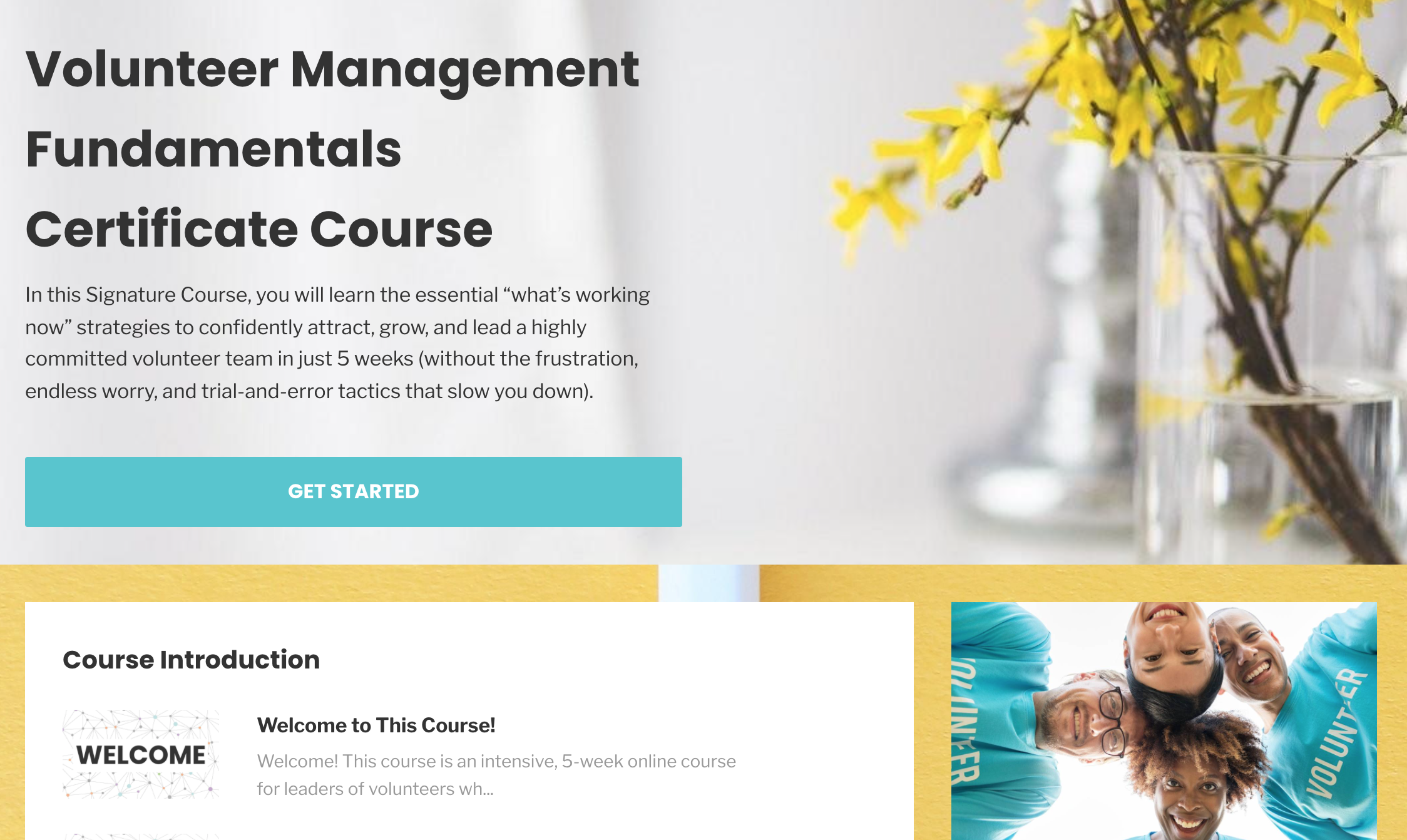How to Match Volunteers with Rockin’ Roles: Your Complete Guide
Learning to match volunteers isn’t rocket science, but it does take a little forethought. You need to know what you are specifically looking for, find out what each volunteer has to offer, and explore what they would like to contribute. This post shows you how to accomplish all three.
First, to ensure you make a perfect match, you must first understand the particular capabilities you are seeking for a specific volunteer role.
You can do this by first developing a solid list of Knowledge, Skills, and Abilities (KSA’s) for each role.
KSAs are a solid foundation from which to build toward the perfect alignment between volunteer talents and organizational needs. You can include them in recruitment postings, team or individual position descriptions, volunteer self-assessments, and learning goals for orientation and training programs.
When volunteers are able to tap their true strengths (these are not always those they use at work), they feel more fulfilled and have a greater sense of personal volition and agency.
Use KSA’s to Match Volunteers with Roles Where They Can Shine
KSAs describe the competencies volunteers need to be successful on the job.
They can also include key attitudes you expect once they join. Your list may include minimum qualifications that must be achieved before a volunteer will be appointed to a role.
Others can be learned on the job through training and mentoring. Knowing when the competencies are needed is as important as knowing which KSAs you are seeking. So, know which is which before you recruit.
Consider listing KSA skills from three different “buckets” – basic skills every volunteer should have, people skills focused on effective interpersonal relations, and technical skills related specifically tailored to the volunteer role.
Below are only samples — the sky’s the limit.
Choose from these and add others that make sense for your roles and organizational context.
Also, be sure not to overwhelm volunteers by requiring too many. Focus on only a few of the most important or you will intimidate people who want to help but think they don’t have the needed ability.
Basic Skills
- Accurately describing the organization’s mission & programming
- Demonstrating commitment to the program
- Working with others, both as a leader and a follower
- Maintaining a positive attitude
- Using self-care strategies to handle stress
- Managing one’s own time
People Skills
- Exhibiting compassion and caring for others
- Listening attentively to others
- De-escalating angry people
- Accepting and learning from coaching and feedback
- Maintaining proper professional boundaries
- Effectively teaching others to do something, one-on-one
Technical Skills
- Using a computer (internet, software, social media, etc.)
- Developing relationships with community partners on behalf of the agency
- Writing and designing communication materials using plain language
- Operating a vehicle safely
- Following the established protocols for a specific, assigned role
Learn the secrets to writing a captivating volunteer position that works in our Write a Volunteer Position Description that Boosts Recruitment guide HERE >>
Match Volunteers with Their Unique Interests
In addition to matching volunteers based on their competencies and capabilities, it’s also a good idea to check with them about their personal preferences and interests.
Instead of simply asking about availability, preferences for hours worked, and which specific available roles that interest volunteers, why not dig a little deeper?
What to Ask in an Interest Questionnaire
One way you can do so is to ask volunteers to complete an interest questionnaire.
This self-assessment can help you better understand how volunteers would like to share their skills and talents with your organization without making assumptions based on their experience or profession.
Here are some things you might ask across four domains …
Personal Style
- How do you handle situations that come up in everyday life? How do you deal with surprises?
- How do you figure out your goals? How you go after them?
- How to do you go about solving problems that arise?
Personal Attributes
- Which of the following describe you?
- Thinker – I like to generate innovative ideas, define strategies, think creatively and engage in planning.
- Doer – I like to follow plans, have a strong attention to detail, and am anxious to get things done
- Feeler – I like to make sure there is good group harmony and am usually attuned to what’s going on in a group under the surface.
- Represent Diverse Perspectives or Communities – I’m not just like you and have a unique way of being and seeing the world than most people.
Skills & Talents (Professional, Personal)
- What talents, knowledge, skills, abilities and special training would you like to contribute to the group?
Resources They Want to Share
- What resources to you have access to that could help the team (this could be people, facilities, materials, supplies, etc.)?
Going Deeper with an Interest Interview
You can also explore their interests during an interview, either with or without the interest questionnaire. Note that these interviews are focused more on getting to know the volunteer and less about finding reasons why they should be screened out.
While interviews are best held face-to-face, but phone interviews are also acceptable. Review the completed Volunteer Application and ask about any missing or unclear, as well as interesting information that might be clues about their skills and interests.
In addition, the information you gather during the interview can be reviewed later for ideas about how to recognize the volunteer in the future, if they are appointed.
12 Interview Questions to Help You Better Match Volunteers
Below are a few questions to ask that explore the volunteer’s interests and to pinpoint specific types of roles that might be a good fit for the applicant. Adjust them, as needed, for your context.
1) Tell me about yourself (hobbies, interests, past/present career, etc.).
2) How did you hear about our program? What appealed to you about our opportunities?
3) Have you volunteered before? Are you still volunteering? If you left, why did you leave?
4) What do you like about volunteering? What did you dislike?
5) Do you have any specific knowledge, skills or talents you would like to contribute? Are there things you’d rather not do?
6) In addition to helping, what are you hoping to gain from your volunteer experience here?
7) Explain a time when you had to work as a member of a team. What role did you naturally take on and what kind of member were you? Were there any challenges, and if so, how did you handle them?
8) What makes you feel appreciated when you volunteer?
9) If the volunteer role requires comprehension of complex information — Are you willing to learn about complex subjects and how to explain them in a way people can understand? What do you think the challenges might be?
10) If volunteer role works with clients directly — Scenario: You have met with a client a few times. They earn a small social security check and struggle to make ends meet. Frequently, they must make the choice between food and their medications. You feel a lot of empathy for the client’s situation. Today, they are in desperate shape and ask to borrow $5 to pay for the co-pay for their blood pressure medication. What do you do?
11) If volunteer role requires computer use — Are you comfortable with using computers? Are you comfortable with email communications? Is modern technology something you want to learn if you are new to it?
12) If volunteer role requires attention to detail — Do you enjoy doing detail work and paperwork?
Double Check How You Match Volunteers: Are You Delegating or Dumping?
Before you match volunteers, it’s a good idea to double check the quality of the work you are delegating as well as the way in which you are handing off responsibility for tasks.
Skilled delegation of volunteer team duties is an art that many managers, even experienced ones, struggle with.
In the harried rush to meet deadlines, respond to email, return phone calls, and handle crises, we try to communicate the best we can, cross our fingers, and then rush off to the next thing.
But delegation of a low-quality task will also result in an unsatisfactory match for a volunteer. This could lead to retention problem down the road.
Is this most effective tactic overall? Probably not — not with our paid staff and certainly not with our volunteer team partners.
When working with volunteers, saving time isn’t the only issue at stake when poor delegation occurs.
Paid staff may be more resilient and able to accommodate a dysfunctional delegation style. They are getting paid and have come to expect it in many workplaces.
Volunteers? Not so much.
It doesn’t take too long for volunteers to get frustrated with the lack of information. They may feel “dumped on” if they are assigned tasks they didn’t really agree to or take more time than they have on hand to give.
They may become discouraged when they are asked to re-do a task multiple times because they weren’t given clear guidelines in the first place or the process for approval keeps changing on them.
Poor delegation hurts not only your productivity. It also erodes your team morale and, ultimately your volunteer retention.
So, it bears taking a good, hard look at.
Certainly, some volunteers can “go with flow” more than others. But, by improving your delegation skills, you can meet everyone’s need for clear information and a chance to make a significant difference at your organization.
6 Steps to More Effective Delegation to Your Volunteer Teams
Here are some concrete ways to improve your delegation.
1) Ask your team directly how you can do better — Different people need different information, in different ways. The first step is knowing their preferences so you are sure to deliver information in a way that suits their needs.
2) Gather all the necessary info needed for the project BEFORE you assign it — For example, if it’s a document, what are the graphic standards (i.e., font, layout, 508 compliance, etc.)? What are your expectations around layout (page numbers, graphic design, etc.) When is the interim draft due? When is the final due?
3) Have a list of good examples to live up to, from the start — If there are other products or projects that have been successful, you need share them (or links to them) up front, before they get started; it will help folks visualize what the result might look like.
4) Explain the concept and context around the project more fully — People need to know how the task fits into the larger picture. Why is it important? How does the product or project interface with others? You want your volunteer teams to know how each task makes a difference and adds to the whole.
5) Be clear about the review process from the beginning — Who will review the drafts, and how will it be decided when the result has been achieved? This isn’t always easy to do because some projects take more tinkering with than others. But, if you can at least lay out a general process, it will help your team feel more in control, confident they are on track, and aware if they are not.
6) Explain how to get help, specifically — You might already encourage your team to contact you if they have questions, but I think people really need something more concrete. If you are a busy person, when can they count on my undivided attention? Is it first thing in the morning via email? Is it during a 15-minute meeting they’ve requested through your calendar software? Is it a verbal check in at the end of the day? Consider what works best for both yourself and the other person, and then stick to it.
In the end, by improving your delegation with a little investment up front, everyone will save time eventually.
If you’re willing to adjust your leadership style, everyone will reap rewards down the line.
And you’ll become well-oiled machine you aspire to be.
Learn a Complete Volunteer Engagement System that Works
One of the best things you can do to acknowledge the valuable contributions of volunteers is to give them an exceptional place to do their work. It all starts with solid volunteer program design and impeccable implementation.
Our volunteer management certificate course helps you develop systems and frameworks that add more predictability to your practice, including how you match volunteers. Knowing what comes next, and what levers to pull to influence a specific result are super helpful to working in a calmer, more methodical way. Your volunteers will benefit, too!
If you’re not feeling completely organized around your volunteer program or strategy, and you’re just not sure what steps to take next, then our signature online course is the perfect fit for you.
Join the Wait List for Our Next Session – Volunteer Management Fundamentals Certificate
Join us for the most comprehensive program in the field for leading a high-impact volunteer engagement strategy that works.
This online course is the only implementation program of its kind that not only shows you exactly how to attract qualified volunteers – but how to make your org the place they want to return to repeatedly.
Over 5 weeks of instruction, combined with weekly live Q&A coaching calls, you will learn everything you need to implement or make improvements to your volunteer programming. As a student, you’ll also be invited to our live Q&A coaching calls and have lifetime access to the course.
The Volunteer Management Fundamentals Certificate is the complete package to help you get there!









